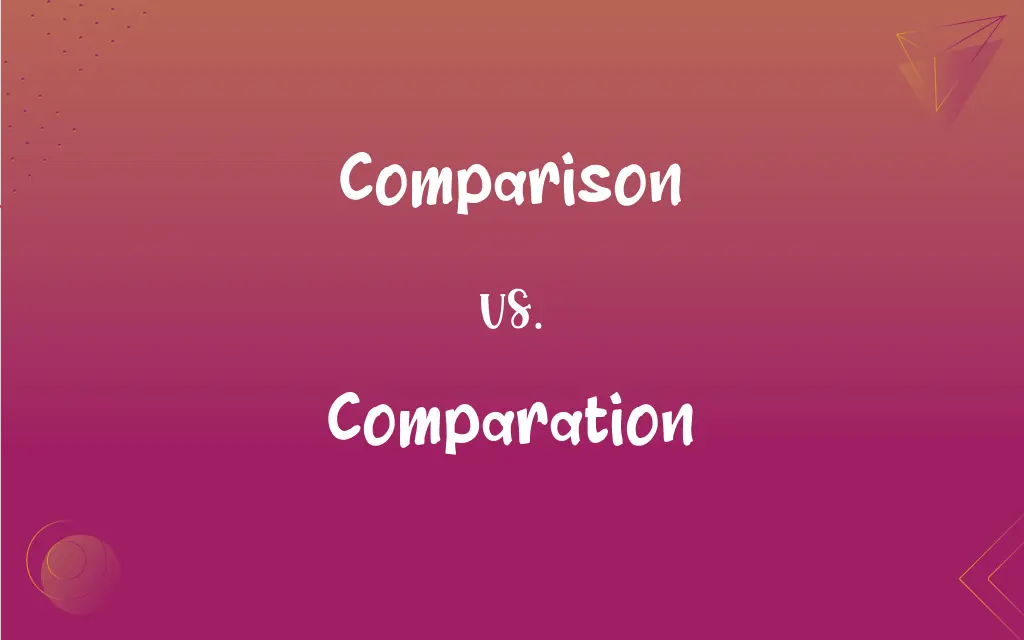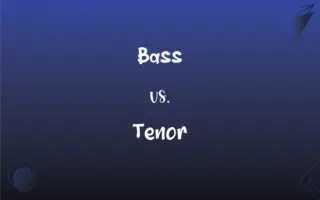Comparison vs. Comparation: What's the Difference?
Edited by Harlon Moss || By Janet White || Updated on September 18, 2023
"Comparison" is a widely-used English term referring to the act of evaluating similarities and differences between two or more items. "Comparation" is generally considered an archaic or non-standard variant of "comparison" and is seldom used.

Key Differences
The term "Comparison" is commonly used in both everyday language and academic contexts to describe the act of comparing two or more things. "Comparation," on the other hand, is rarely used and is often regarded as an archaic or erroneous version of "comparison."
"Comparison" is standard in American and British English, used in legal documents, academic papers, and daily conversation. "Comparation" may be encountered in older texts or as a non-standard form, but it is not prevalent in contemporary usage.
In grammatical terms, "comparison" refers to the syntactic and morphological ways in which adjectives and adverbs are modified to show differences in degree. "Comparation" doesn't carry such a specific grammatical role and is seldom, if ever, seen in modern grammar books.
Both words originate from Latin. "Comparison" comes from 'comparatio', while "Comparation" is a more direct transliteration of the Latin term. However, "comparison" has gained widespread acceptance, and "comparation" has fallen into disuse.
Comparison Chart
Usage Frequency
Commonly used
Rarely used
ADVERTISEMENT
Standardization
Standard in American and British English
Non-standard/Archaic
Grammatical Role
Used in describing grammatical constructs
No specific grammatical role
Contexts of Usage
Everyday, academic, legal
Older texts
Origin
Latin 'comparatio'
Direct transliteration from Latin
Comparison and Comparation Definitions
Comparison
The act of evaluating similarities and differences.
The comparison between the two cars revealed some key differences.
ADVERTISEMENT
Comparation
An archaic variant of comparison.
Comparation is seldom used in modern English.
Comparison
A rhetorical device in literature and speech.
The poet’s comparison of love to a rose was clichéd but effective.
Comparation
Sometimes used in older texts.
I found the word comparation in a 19th-century manuscript.
Comparison
The act of comparing or the process of being compared.
Comparation
Generally not used in modern grammatical discussions.
The term comparation is not mentioned in most contemporary grammar books.
Comparison
A statement or estimate of similarities and differences.
Comparation
A non-standard form of comparison.
Comparation is not considered standard English.
Comparison
The quality of being similar or equivalent; likeness
No comparison between the two books.
Comparation
Rarely seen in academic or legal contexts.
I wouldn't use comparation in an academic paper.
Comparison
(Grammar) The modification or inflection of an adjective or adverb to denote the positive, comparative, and superlative degrees, as in English, along with the equative degree in certain other languages, such as Irish Gaelic.
Comparation
(obsolete) A making ready; provision.
Comparison
The act of comparing or the state or process of being compared.
To bring a thing into comparison with another;
There is no comparison between them
Comparation
(nonstandard) Comparison.
Comparison
An evaluation of the similarities and differences of one or more things relative to some other or each other.
He made a careful comparison of the available products before buying anything.
Comparation
A making ready; provision.
Comparison
With a negation, the state of being similar or alike.
There really is no comparison between the performance of today's computers and those of a decade ago.
Comparison
(grammar) A feature in the morphology or syntax of some languages whereby adjectives and adverbs are inflected to indicate the relative degree of the property they define exhibited by the word or phrase they modify or describe.
In English, adjectives and adverbs have three forms when making a comparison: the plain form "hot", the comparative form "hotter", and the superlative form "hottest".
Comparison
That to which, or with which, a thing is compared, as being equal or like; illustration; similitude.
Comparison
(rhetoric) A simile.
Comparison
(phrenology) The faculty of the reflective group which is supposed to perceive resemblances and contrasts.
Comparison
The act of comparing; an examination of two or more objects with the view of discovering the resemblances or differences; relative estimate.
As sharp legal practitioners, no class of human beings can bear comparison with them.
The miracles of our Lord and those of the Old Testament afford many interesting points of comparison.
Comparison
The state of being compared; a relative estimate; also, a state, quality, or relation, admitting of being compared; as, to bring a thing into comparison with another; there is no comparison between them.
Comparison
That to which, or with which, a thing is compared, as being equal or like; illustration; similitude.
Whereto shall we liken the kingdom of God? Or with what comparison shall we compare it?
Comparison
The modification, by inflection or otherwise, which the adjective and adverb undergo to denote degrees of quality or quantity; as, little, less, least, are examples of comparison.
Comparison
A figure by which one person or thing is compared to another, or the two are considered with regard to some property or quality, which is common to them both; e.g., the lake sparkled like a jewel.
Comparison
The faculty of the reflective group which is supposed to perceive resemblances and contrasts.
Comparison
To compare.
Comparison
Examining resemblances or differences
Comparison
Relation based on similarities and differences
Comparison
Qualities that are comparable;
No comparison between the two books
Beyond compare
Comparison
A grammatical construct involving adjectives or adverbs.
In the comparison of small, smaller, and smallest, the word changes degree.
Comparison
An assessment of relative value or quality.
Your comparison of the artworks was quite insightful.
Comparison
An examination of correspondences or contrasts.
The comparison of DNA sequences can be highly informative.
FAQs
What does Comparison mean?
Comparison refers to the act of evaluating similarities and differences between things.
What does Comparation mean?
Comparation is generally an archaic or non-standard variant of comparison.
Can I use Comparation in academic writing?
It's best to avoid it as it's considered non-standard.
Is Comparation a valid English word?
While it exists, it is considered non-standard and is rarely used.
Are the two words interchangeable?
No, "comparison" is the standard term, and "comparation" is rarely used.
What is the grammatical role of Comparison?
It is used to describe constructs involving adjectives and adverbs changing in degree.
Can I use Comparison in academic writing?
Yes, "comparison" is standard in academic contexts.
Is Comparison used in legal contexts?
Yes, it is standard in both American and British legal contexts.
Does Comparation have a specific grammatical role?
No, it doesn't have a specific role in modern grammar.
Is Comparation used in legal contexts?
No, it is not standard and is best avoided.
Can Comparation be used in everyday speech?
It's best to avoid it in favor of "comparison," which is the accepted term.
Where does the word Comparison originate from?
It originates from the Latin word 'comparatio'.
Where does the word Comparation originate from?
It is a direct transliteration from Latin.
How frequent is the use of Comparation?
It is rarely used and is generally considered archaic.
How frequent is the use of Comparison?
It is commonly used in a variety of contexts.
About Author
Written by
Janet WhiteJanet White has been an esteemed writer and blogger for Difference Wiki. Holding a Master's degree in Science and Medical Journalism from the prestigious Boston University, she has consistently demonstrated her expertise and passion for her field. When she's not immersed in her work, Janet relishes her time exercising, delving into a good book, and cherishing moments with friends and family.
Edited by
Harlon MossHarlon is a seasoned quality moderator and accomplished content writer for Difference Wiki. An alumnus of the prestigious University of California, he earned his degree in Computer Science. Leveraging his academic background, Harlon brings a meticulous and informed perspective to his work, ensuring content accuracy and excellence.






























































